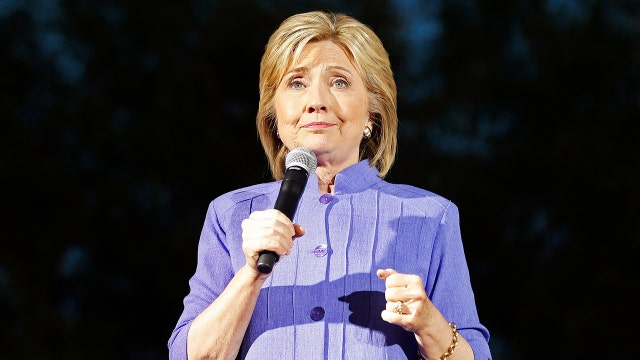Has Hillary secured her nomination?
Critics: Democratic candidate has no competition as of yet
Hillary Clinton is drawing head scratches from the White House for saying she decided to oppose the Pacific-nation trade deal after "looking at it" -- even though the official text is not public.
The Democratic presidential front-runner addressed her flip-flop on the Trans-Pacific Partnership, a deal she backed as secretary of state, at Tuesday's Democratic debate.
She acknowledged she once called it the "gold standard," but added: "It was just finally negotiated last week, and in looking at it, it didn't meet my standards -- my standards for more new, good jobs for Americans."
She suggested the agreement would not help raise middle-class American wages.
Yet while the U.S. and 11 Pacific Rim nations finalized the accord earlier this month, the final text has not been released, a fact confirmed by the White House on Wednesday.
"I noticed that, too," White House Press Secretary Josh Earnest said when asked about Clinton opposing a deal whose text has not been posted.
Earnest stressed that the administration will "make the text public, both prior to the president signing it but also prior to the responsibility that Congress has to consider and ratify it."
Details of the agreement have nevertheless emerged, and WikiLeaks has posted a purported version of it. But asked about that leaked document on Wednesday, Earnest stressed that the final text is "substantial and lengthy," and "it would take ... an exhaustive review of what has been posted already to determine whether or not it reflects ... what has been agreed to."
"It's a rather lengthy document," he said, adding that he doesn't know when exactly it might be released.
Even before Tuesday's debate, the Obama administration was ramping up its effort to promote the years-in-the-making deal, which is aimed at lowering trade barriers for the 12 nations party to it.
Earnest said it would cut "18,000 import taxes on U.S. goods that are applied by other countries" and include "specific, enforceable provisions related to both labor protections and higher environmental standards."
The deal has won support from some Republicans in Congress, but the Obama administration has had to fight Democrats who say it doesn't do enough to protect American workers.
In coming out against the deal, Clinton joined several Democratic primary rivals -- notably Vermont Sen. Bernie Sanders -- who already opposed the pact.
Her reversal, though, led to charges of political opportunism, but Clinton maintained Tuesday that she's been "consistent."
"Over the course of my entire life, I have always fought for the same values and principles, but, like most human beings ... I do absorb new information," she said.













































